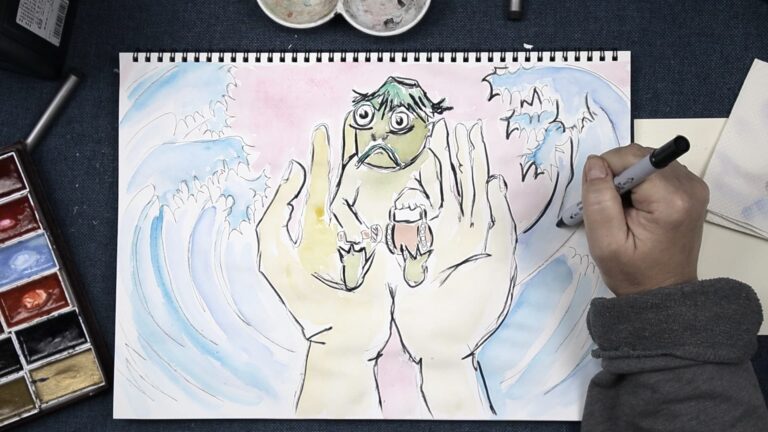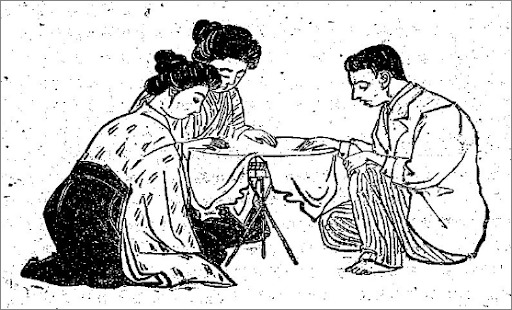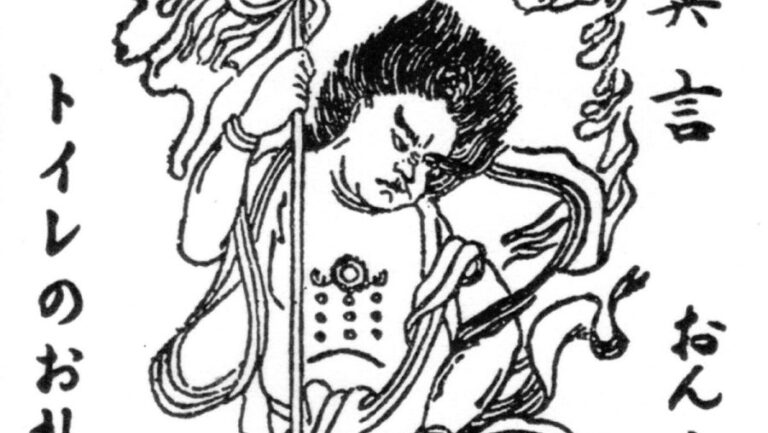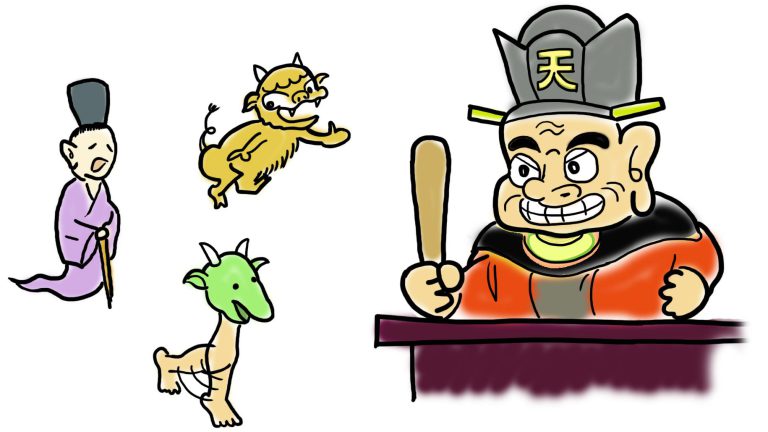It’s been a rough couple of years, so today let’s talk about some Japanese good luck superstitions.
Hello, this is Thersa Matsuura and you’re listening to Uncanny Japan.
When was the last time I did a show about Japanese superstitions? No, don’t you go searching. I already looked, and the answer is: Episode 56, way back in July of 2020. That’s when I talked about food superstitions. I’m sure you’ll remember and still practice the “don’t mix your eel with your umeboshi/pickled plums” rule.
Today though, it’s the tail end of 2021 and wouldn’t it be nice to go into the New Year with at least a little luck on our side? Let’s learn some Japanese superstitions, but the auspicious variety. Little signs from the Universe that everything is going to be okay.
Hey hey! Did we make it to the end of 2021? I mean, it’s not over yet. I’m sure there are thousands if not millions of meteors hurtling our direction, and I’m not sure if the heat death of the universe can happen overnight, but with the way things have been going… Anyway, we’re almost to the end of 2021, right? Is everyone nervous about 2022? That’s understandable.
With that in mind, for the last show of the year I want to delve into some Japanese good luck superstitions — because sometimes you just need to believe something is on your side.
Fuku Mimi/Lucky Ears
Let’s begin with a thing you have no control over, but might apply to some of you. Reach up and grab an ear lob. Is it a small, dainty ear lobe, or a bigger, more droopy one? I hope you said bigger and droopy, because those are some mighty lucky ears you got there.
The superstition is “mimi tabu ga ookii to kanemochi ni naru/耳たぶが大きいと金持ちになる”. In English, if you have big earlobes you’ll become rich. One thought as to why this saying came to be is from the depictions of Daikokuten/大黒天, one of the shichi fukujin/Seven Lucky Gods. Daikokuten is easy kanji to read, big, black, heaven, or great black diva.
He’s the happy looking guy, holding a magic mallet and wearing a peasant’s cap called a daikoku zukin. He’s usually standing on a couple bales of rice and carrying a sack, too. Daikokuten is the god of wealth, farmers, food, and good fortune. He’s also got humongo earlobes. FYI, if you have large ear lobes they’re called fuku mimi/福耳. Lucky ears.
I read in one place that there are two types of fuku mimi. Big ear lobes that kind of curl up at the ends. Which is okay, can’t really imagine that, but maybe? If you can rest a grain of rice on the end of them, that’s what I’m talking about and those are the luckiest of all. You get ALL the money.
But ear lobes that are just very long, that look more like you see on the statues of the Buddha and Confucius, of course you get your regular dose of fortuity, but also, it means you’ll be a great person, maybe a saint, or a Buddha or sage.
An aside, I have fuku mimi but I’m the exact opposite of rich or a saint. I’m not giving up though.
Lucky Snakeskins
For number two lets do something that isn’t people-body specific. This is something anyone can do, if they want to to garner a little extra luck and wealth in their lives.
The saying goes something like: Hebi no nukegara wo saifu ni irete kin un appu / 蛇の抜け殻を入れて金運アップ.
If you place a snake skin, or some of a snake skin, in your wallet your fortune in money matters will improve. This one, too, comes from of the Seven Lucky Gods, Benzaiten to be exact. Benzaiten is our lady Lucky God. She carries a biwa, Japanese lute, and like Daikokuten traveled all the way from India, through China, to Japan. With some changes along the way, of course.
Among other things, Benzaiten controls treasure and her messenger is a snake. Snakes shed their skins and get bigger, which they do repeatedly throughout their lifetimes, and that’s a pretty auspicious thing. Shedding the old, becoming new, yet bigger, stronger. You can see why snake skins are a lucky symbol.
However, not all snakes are created equal. White snakes are particularly lucky. They’re thought to be guardian deities that protect your house as well. Their skins are also the best to keep inside your wallet. I mean, if you have a choice or something. Like you’re hiking in a forest and there on the path is a black snakeskin and a white snake skin. Take the white one. More luck.
But I think any snake will do. I read one place that poisonous snakes are thought to be powerful just because they are so poisonous. The stronger the poison, the stronger the luck. That doesn’t mean you should go poking around in bushes looking for poisonous snake skin. You might wind up poking a poisonous snake and that won’t be lucky at all.
As far as how to put the skin into your wallet, fold it up nicely and stick it in anywhere really, any place where it won’t get smushed or torn or anything.
Another way to keep the luck flowing: every once in a while remove it and out loud, give the snake skin a little thank you.
By the way, you’ll often see yellow wallets in Japan. Those are believed to be lucky and money inducing as well. You’ll also sometimes see a wallet made of snakeskin or faux leather that is printed to look like snake skin. Again, good luck.
Just think if you had a yellow wallet made of real snakeskin with a white snake’s skin inside. Imagine how rich you’d be.
A Standing Tea Stem in your Tea
Next! Number three. Ready? Oyunomi no naka ni chabashira ga tatsu to kichiji no maebure/お湯呑みの中に茶柱が立つと、吉事の前触れ
If you see a tea stem standing or floating upright in your teacup, it’s very good luck. I guess this is also an old superstition, but I’ve heard it a lot.
One thing is it’s hard enough for a tiny tea stem to stand straight up in a cup of tea, but also that stem had to make it through the mesh strainer thing that is supposed to stop tea from getting through. Then it had to go into your cup specifically and stand itself upright. Extra rare. Extra lucky.
Although some wet blankets say that the superstition was started by tea sellers who wanted to sell a very stemmy, not good quality tea. Customers were buying the good stuff only. Hmmm, how do we sell this stem laden tea here? Hey, I got an idea. Hear me out.
I have heard that you’re not allowed to tell or show anyone when it happens either. If you tell someone, then the good luck will transfer to them. You can mention it but only after you’ve drank the little stem. There’s even a superstition that says you should put the stem in the left sleeve of your kimono.
Okay, you can’t control the size of your ear lobes, unless you’re gauging, then, hey, more power to you! Also, it’s not super easy to find a snake skin either. But I can give you a couple tips to get a tea stem to float vertically in your cup.
First, use bancha or kuki cha, not the good stuff. Lower grades of tea have more stems. Then use a kyuusu or tea pot that has a very wide mesh. Ups the chances those little buggers will get through. Finally, when pouring, pour slowly. That increases your chances for an upright standing tea stem.
Another Money Superstition
Okay, last one, another money and wallet superstition that I just heard recently actually. It’s cute and a friend told me about it when I noticed her fiddling with her money. She was getting change and when putting the bills in her wallet she looked at the and purposefully slid the paper money in upside down, so that the top of Hideo Noguchi’s head pointed downward into the wallet. When I asked why she did that she said so he doesn’t escape easily. The money stays in my wallet longer.
Oh, and also remember on the 31st to have a dream about a hawk, Mount Fuji or an eggplant. That’s also quite lucky. I think I talked about that superstition in Episode 2, hatsu yume/初夢, your first dream of the New Year.
Japan Distilled Podcast
Before I go, I haven’t mentioned it in awhile but if your interested in Japanese spirits — the alcoholic kind — Do give a listen to the podcast Japan Distilled. It’s so interesting. Stephen and Christopher really really know their stuff and they weave history, travel, and their own unique experiences into all of their episodes which makes them so much fun and informative to listen to. They just wrapped up their first year so you can go back and binge those to get ready for 2022. Uncanny’s Rich Pav does their sound and editing so you know they sound good too.
Speaking of whom, I’d like to thank Rich Pav my audio engineer for his impeccable chops. Reach out if you have or want to start show. From next year he going to take on a few more clients.
Thank you patrons, because of you I can do this. Thank you listeners and reviewers and people who tell their friends about the show.
Everyone yoi otoshi wo which is what you say before January first, wishing someone a happy new year. I’ll talk to you in 2022.
Credits
Intro and outro music by Julyan Ray Matsuura
Laia by Woeha
Link: https://filmmusic.io/song/8710-laia
License: https://filmmusic.io/standard-license






